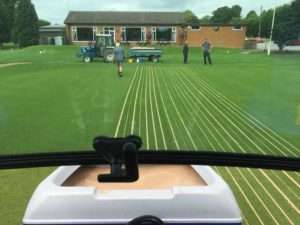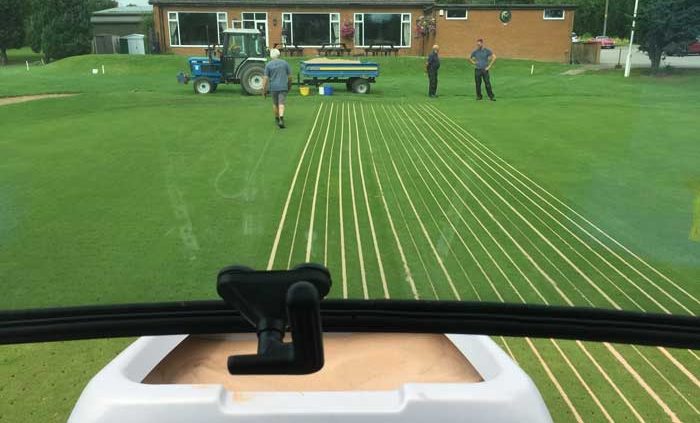Rigby Taylor delivers a first-class course at Alfreton GC
 Rigby Taylor delivers a first-class course at Alfreton GC – “We’re only an 11-hole course – we’d love to be able to expand – but we think we’ve got the best small course in Derbyshire!”
Rigby Taylor delivers a first-class course at Alfreton GC – “We’re only an 11-hole course – we’d love to be able to expand – but we think we’ve got the best small course in Derbyshire!”
Head greenkeeper Andy Fenn doesn’t hold back when describing Alfreton Golf Club and while he admits that his is a biased view, visitors to the course undoubtedly also agree with his sentiments.
Aged 59, Andy has been at the established (since 1892) traditional parkland course for almost 20 years, after a lifetime in volunteer groundsmanship that began in his late 20s as a player at his local cricket club then part-time at Alfreton Town FC before joining the golf club as assistant head greenkeeper. He was appointed head greenkeeper in November 2015.
“Before I joined the club I would play here so I knew the course,” says Andy. After he took over the lead role, it is fair to say that the course has continually progressed – “and with the initial greens team of two full-time and one part-timer becoming three full-timers, including myself, we’ve been able to drive up standards on the course”.
He’s done this by not only applying all those years of experience and by rethinking the maintenance regime, but also by marrying the team’s extensive skills set with top-of-the-range amenity supplies from Rigby Taylor, the company at the forefront of supplying innovative products for the successful management and maintenance of turf surfaces.
“Throughout,” he adds, “our actions have been ably supported by the committee and the greens chairman, Roger Foster.”
For example, Andy has instigated changes to the cutting regime with the mowers now in action on every weekday, as well as cutting once over each weekend, with the greens (Rigby Taylor R1 fescue and bent mix) being maintained at 7 mm high in winter and 4 mm in summer, while the tees (R9 ultra-fine rye) are kept at 15 mm and fairways at 20 mm. Two John Deere 220Hs are used as pedestrian greens mowers; and three Ransomes mowers (a Duplex 2, a Fairway 305 and an AR522) are applied to other areas.
Rigby Taylor’s R seed range is pre-treated with Germin-8 – a unique treatment of a cocktail of speciality penetrating surfactants, nutrients, sugars and mycorrhizae to stimulate and support accelerated germination and emergence.
“We have in place a stringent routine of aeration and scarifying, to minimise thatch levels,” Andy continues. “On a clay-based site such as ours, there’s no rigid timetable for aeration. Also, it is weather dependent so we can’t aerate even if it is slightly too wet – and we have to time it for when the conditions are right, normally spiking to four inches deep then applying around 40 tonnes of sand.”
This on a course where the greens were gravel-banded 20 years ago and last year were slitted/sand-banded. “We did nine greens in a day-and-a-half,” he says.
Andy confirms that the use of Rigby Taylor products continues to play a key role in the way the course is presented and how it plays.
“We’ve been dealing with Rigby Taylor for a number of years and we adopt a wide-ranging programme including fertilisers such as Microlite Activ8 conventional release granules, as well as chemical treatments that include the Fusion, Foremost and Rayzor fungicides, TriMate stress relief and recovery agent, and the Breaker Biolinks wetting agent.
“These are not the cheapest products on the market but in my view they certainly represent excellent value for money. They give us the results we need and, of course, the local sales representative Mark Robinson also provides a lot of back up and support.”
He adds: “We take soil samples every year and with Mark we establish an annual programme of treatments. There’s no doubt that the course has improved because of this. I believe that it’s all about striking the right balance between nitrogen and biostimulants for turf health, and achieving a consistent playability with no peaks and troughs in the way the course plays or in the presentation of the turf.
“With regard to the latter, our use of Rigby Taylor’s Magnet Dynamite chelated iron gives excellent results in terms of turf colour, and the company’s Spike potassium-silica treatment is used for ‘standing up’ the turf.
“This is exactly what we need because our members expect to be able to use a first-class course all year round. We have to deliver that.”
Andy and his team also have to contend with the 4,000 or so trees on the site: “Working closely with the Forestry Commission, it is an ongoing task to sort out the trees that are affecting the course. We are taking a much more critical view of how trees are affecting or could affect the greens.”
With a background in cricket and football, he also highlights that “grass science is transferrable, especially in terms of the fertilisers used and the diseases faced”, but he admits that golf course maintenance is probably the most testing “since there are variable surfaces to be maintained simultaneously”.









